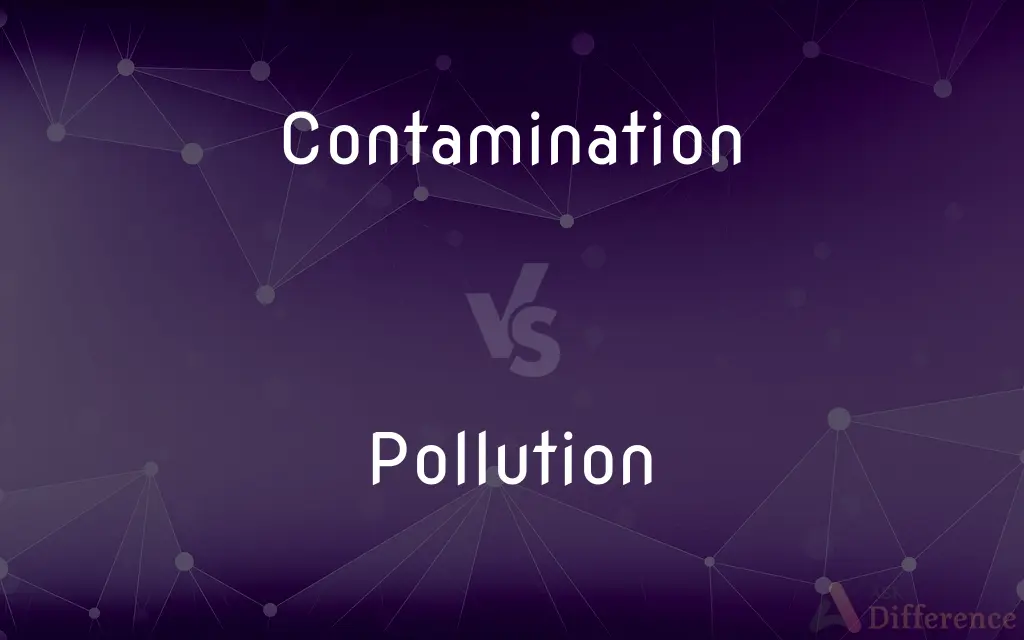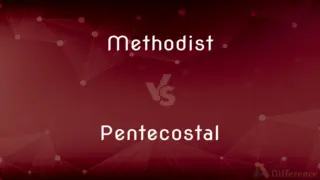Contamination vs. Pollution — What's the Difference?
By Tayyaba Rehman — Updated on October 5, 2023
Contamination refers to the presence of impurities or unwanted elements, while pollution denotes the introduction of harmful substances or agents into the environment.

Difference Between Contamination and Pollution
Table of Contents
ADVERTISEMENT
Key Differences
Contamination typically describes the presence of impurities or unwanted elements in a substance or environment. Pollution, on the other hand, specifically points to the introduction of harmful substances or agents into the natural environment, causing adverse effects. When we speak of contamination, we often think of a localized presence of harmful substances, possibly rendering something unsafe or unusable. With pollution, we envision broader environmental harm affecting ecosystems, human health, or the overall quality of natural resources.
A water supply might become contaminated with bacteria, making it unsafe for drinking. Pollution, conversely, would describe a scenario where industrial waste spills into a river, affecting the aquatic life and the larger ecosystem. Another distinction lies in their usage. Contamination can be used in various contexts, including biology, food safety, and medicine, often denoting the presence of unwanted or harmful agents. Pollution, meanwhile, is largely employed in environmental contexts, discussing air, water, soil, and other types of environmental degradation.
It's essential to understand that while all pollution can be described as a form of contamination, not all contamination necessarily equates to pollution. For instance, a sterile medical instrument becoming contaminated with bacteria doesn't translate to it being polluted. However, when harmful emissions from factories contaminate the air we breathe, it's both a contamination of air and its pollution.
Comparison Chart
Definition
Presence of impurities or unwanted elements
Introduction of harmful agents into the environment
Scope
Can be localized or broad
Typically broader and environmental
ADVERTISEMENT
Contexts
Biology, food safety, medicine, etc.
Mainly environmental (air, water, soil)
Outcome
Renders something unsafe or unusable
Causes broader environmental harm
Usage
Can refer to tangible items or environments
Primarily refers to natural environments
Compare with Definitions
Contamination
Contamination is the presence of a constituent, impurity, or some other undesirable element that spoils, corrupts, infects, makes unfit, or makes inferior a material, physical body, natural environment, workplace, etc.
Pollution
The introduction of contaminants into the environment causing harm.
The factory is accused of causing severe water pollution.
Contamination
The act or process of contaminating.
Pollution
Harmful substances present in the environment.
Plastic waste is a significant source of ocean pollution.
Contamination
The state of being contaminated.
Pollution
The act of making something, especially the environment, dirty or unsafe.
Noise pollution is becoming a concern in urban areas.
Contamination
One that contaminates.
Pollution
Pollution is the introduction of contaminants into the natural environment that cause adverse change. Pollution can take the form of chemical substances or energy, such as noise, heat, or light.
Contamination
The act or process of contaminating
Pollution
The act or process of polluting or the state of being polluted, especially the contamination of soil, water, or the atmosphere by the discharge of harmful substances.
Contamination
Something which contaminates.
Pollution
Something that pollutes; a pollutant or a group of pollutants
Pollution in the air reduced the visibility near the airport.
Contamination
(linguistics) A process whereby words with related meanings come to have similar sounds.
Pollution
Physical contamination, now especially the contamination of the environment by harmful substances, or by disruptive levels of noise, light etc.
Pollution levels are almost always higher in cities rather than the countryside, what with the cars, industry and so on.
Contamination
The influence of one form (often from a foreign language) on the historical development of another form to which it may be related in meaning.
Pollution
Something that pollutes; a pollutant.
Contamination
The process of making a material or surface unclean or unsuited for its intended purpose, usually by the addition or attachment of undesirable foreign substances.
Pollution
The desecration of something holy or sacred; defilement, profanation.
Contamination
The act or process of contaminating; pollution; defilement; taint; also, that which contaminates.
Pollution
The ejaculation of semen outside of sexual intercourse, especially a nocturnal emission.
Contamination
The state of being contaminated
Pollution
Moral or spiritual corruption; impurity, degradation, defilement.
Contamination
A substance that contaminates
Pollution
The act of polluting, or the state of being polluted (in any sense of the verb); defilement; uncleanness; impurity.
Contamination
The act of contaminating or polluting; including (either intentionally or accidentally) unwanted substances or factors
Pollution
The emission of semen, or sperm, at other times than in sexual intercourse.
Pollution
Undesirable state of the natural environment being contaminated with harmful substances as a consequence of human activities
Pollution
The state of being polluted
Pollution
The act of contaminating or polluting; including (either intentionally or accidentally) unwanted substances or factors
Pollution
The degradation of natural resources due to harmful substances.
Air pollution in the city has reached alarming levels.
Pollution
The presence of substances harming the natural state.
Pollution in the lake has affected the fish population.
Common Curiosities
Is all contamination also pollution?
No, while all pollution is a form of contamination, not all contamination necessarily means pollution.
How is pollution specifically defined?
Pollution denotes the introduction of harmful substances or agents into the environment causing harm.
Is pollution always related to environmental harm?
Primarily, yes. Pollution typically refers to harm to the air, water, soil, or other natural resources.
What does contamination primarily indicate?
Contamination indicates the presence of impurities or unwanted elements in a substance or environment.
Can contamination be seen in contexts outside of the environment?
Yes, contamination can be found in contexts like food safety, medicine, and biology.
Are pollution levels increasing globally?
Generally, in many regions, pollution levels, especially air and water, have been on the rise due to industrialization and urbanization.
Are there any natural sources of pollution?
Yes, events like volcanic eruptions and wildfires can introduce pollutants into the environment.
How does air pollution commonly occur?
Air pollution often results from emissions from factories, vehicles, deforestation, and burning of fossil fuels.
Can a sterile environment face contamination?
Yes, if there's a breach in sterile conditions, contamination can occur.
What measures can be taken to reduce pollution?
Measures include using cleaner energy sources, reducing waste, recycling, and implementing stricter regulations.
How do contamination and pollution affect human health?
Both can lead to diseases, respiratory issues, and other health problems due to exposure to harmful agents.
How does contamination affect food safety?
Contamination can introduce pathogens or harmful chemicals into food, making it unsafe for consumption.
What could cause water contamination?
Bacteria, heavy metals, chemicals, and waste can cause water contamination.
Can noise be considered a type of pollution?
Yes, unwanted or harmful noise levels are referred to as noise pollution.
What's a common result of soil contamination?
Soil contamination can lead to reduced agricultural yield and harm to plant and animal life.
Share Your Discovery

Previous Comparison
Methodist vs. Pentecostal
Next Comparison
Byline vs. HeadlineAuthor Spotlight
Written by
Tayyaba RehmanTayyaba Rehman is a distinguished writer, currently serving as a primary contributor to askdifference.com. As a researcher in semantics and etymology, Tayyaba's passion for the complexity of languages and their distinctions has found a perfect home on the platform. Tayyaba delves into the intricacies of language, distinguishing between commonly confused words and phrases, thereby providing clarity for readers worldwide.














































